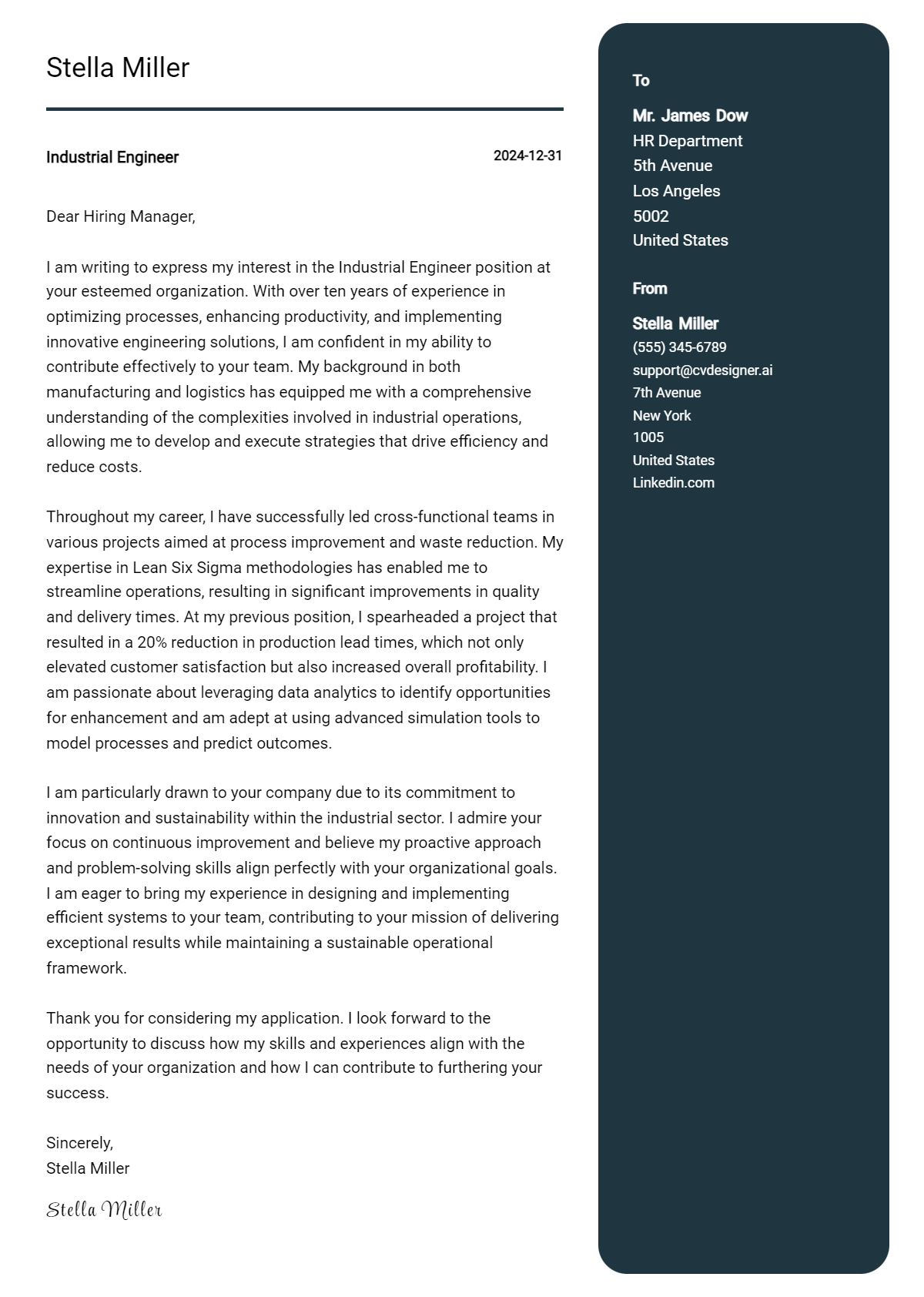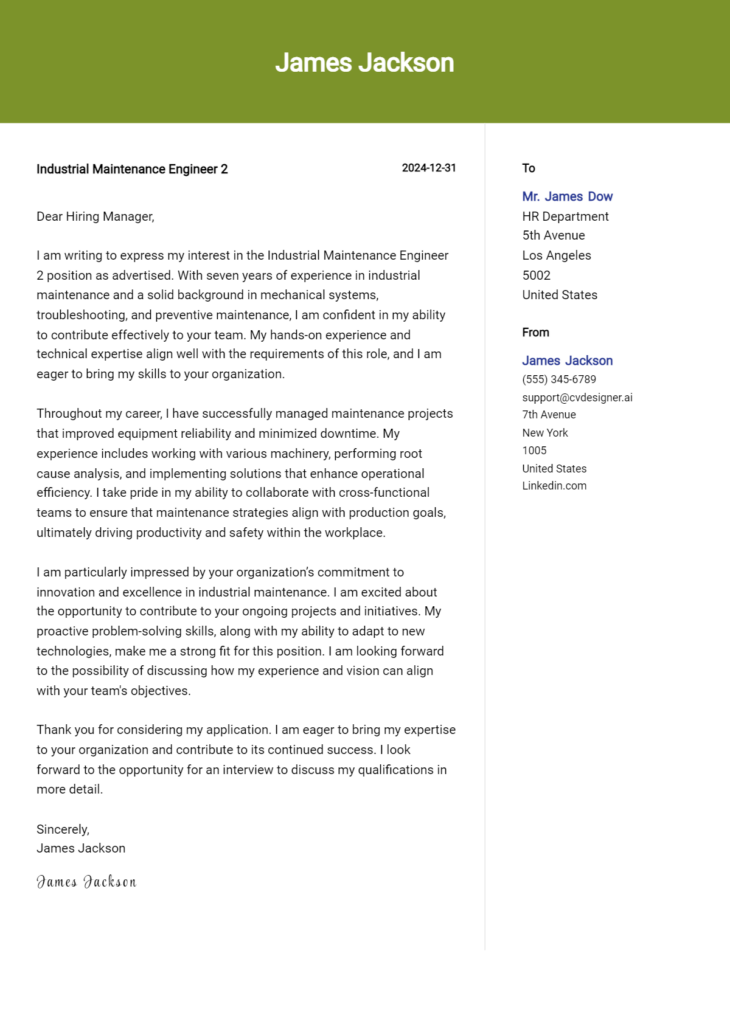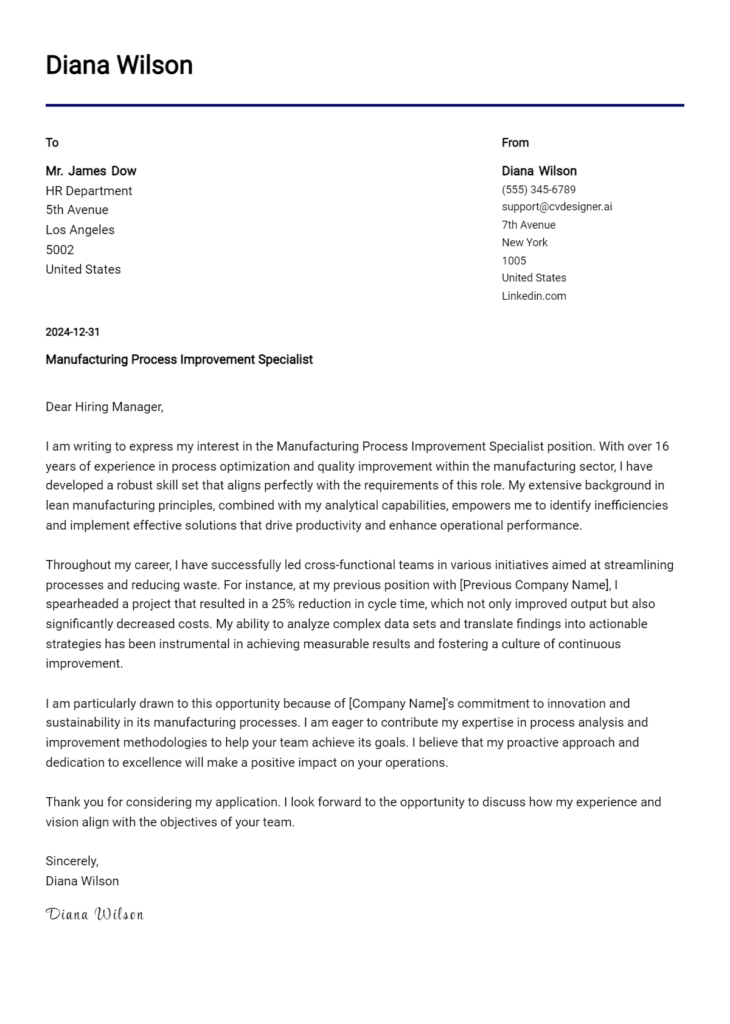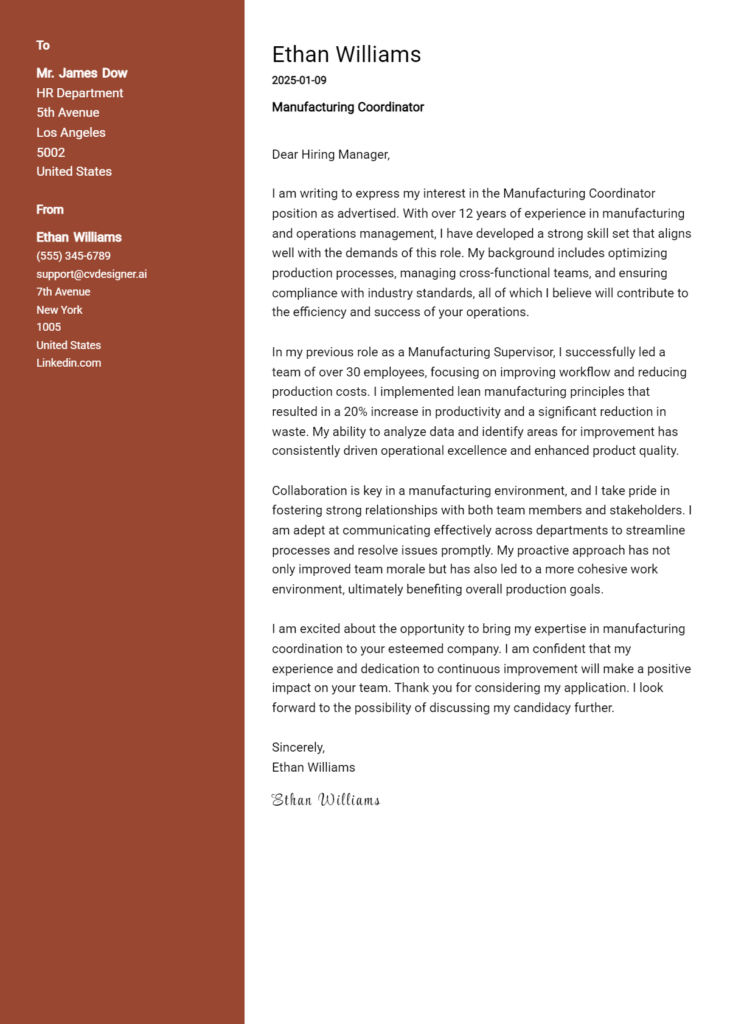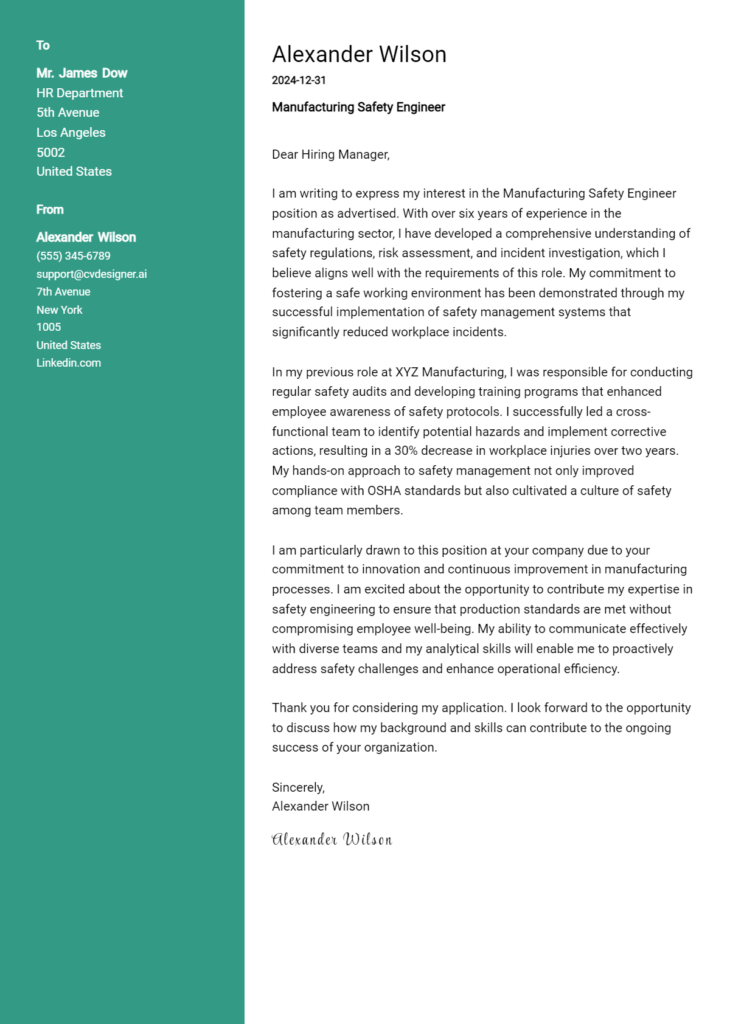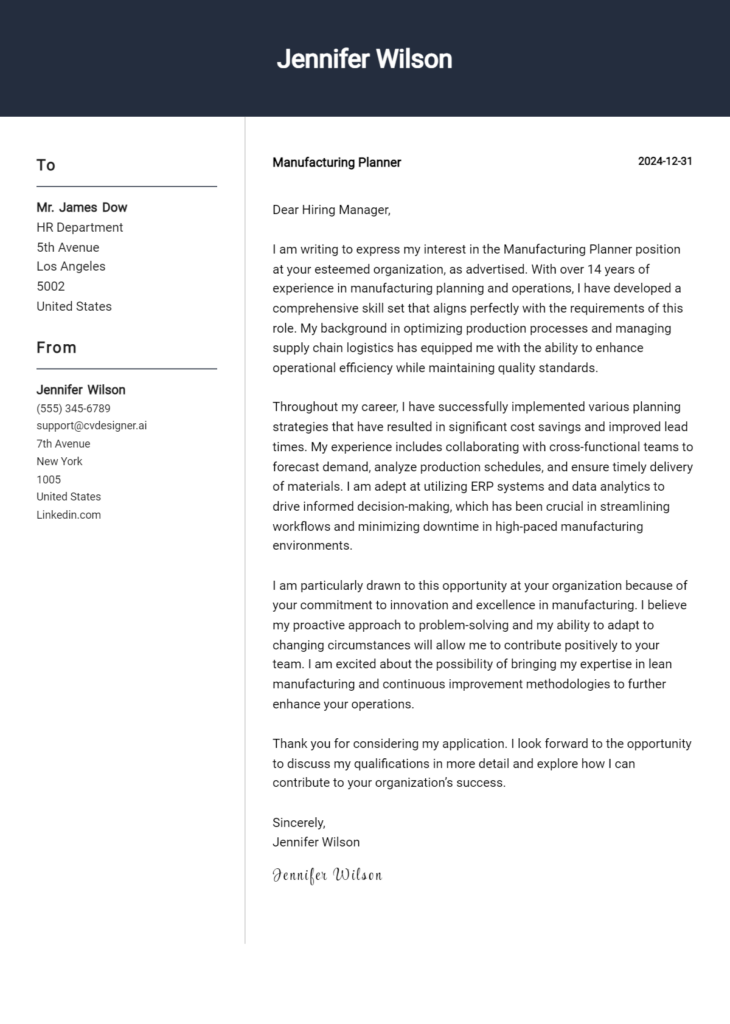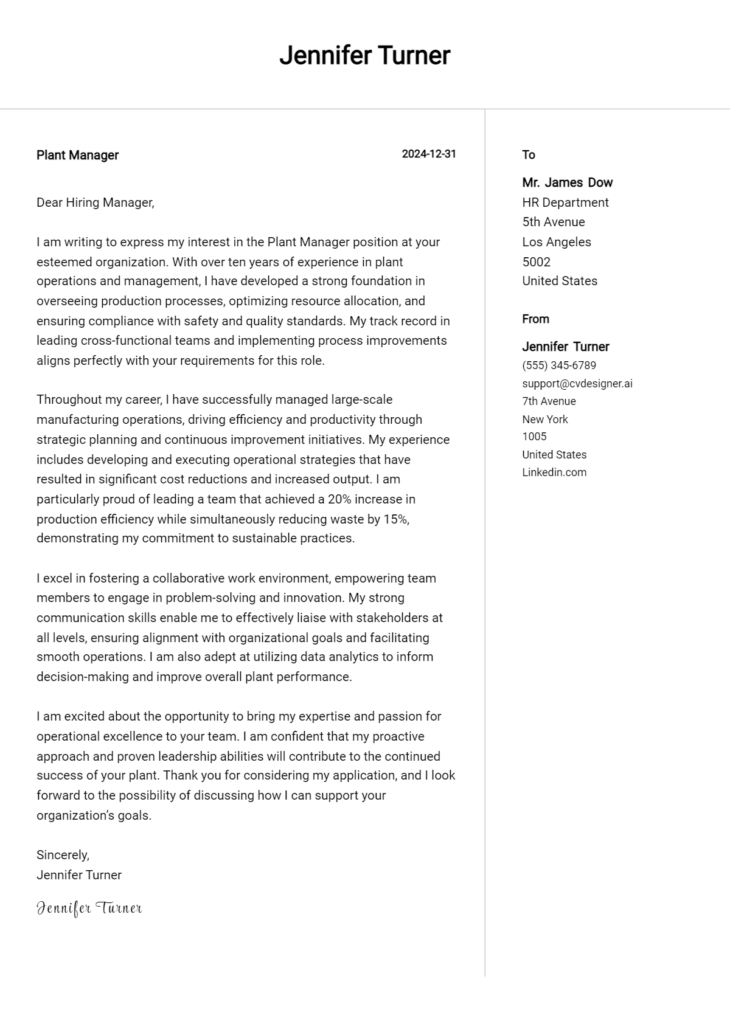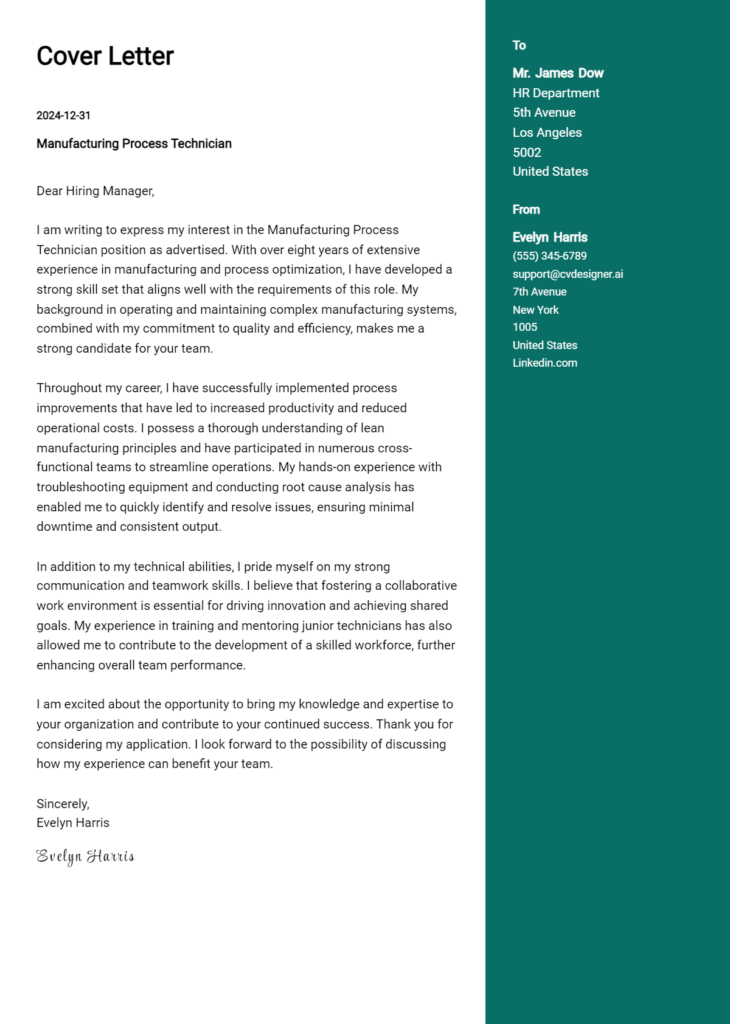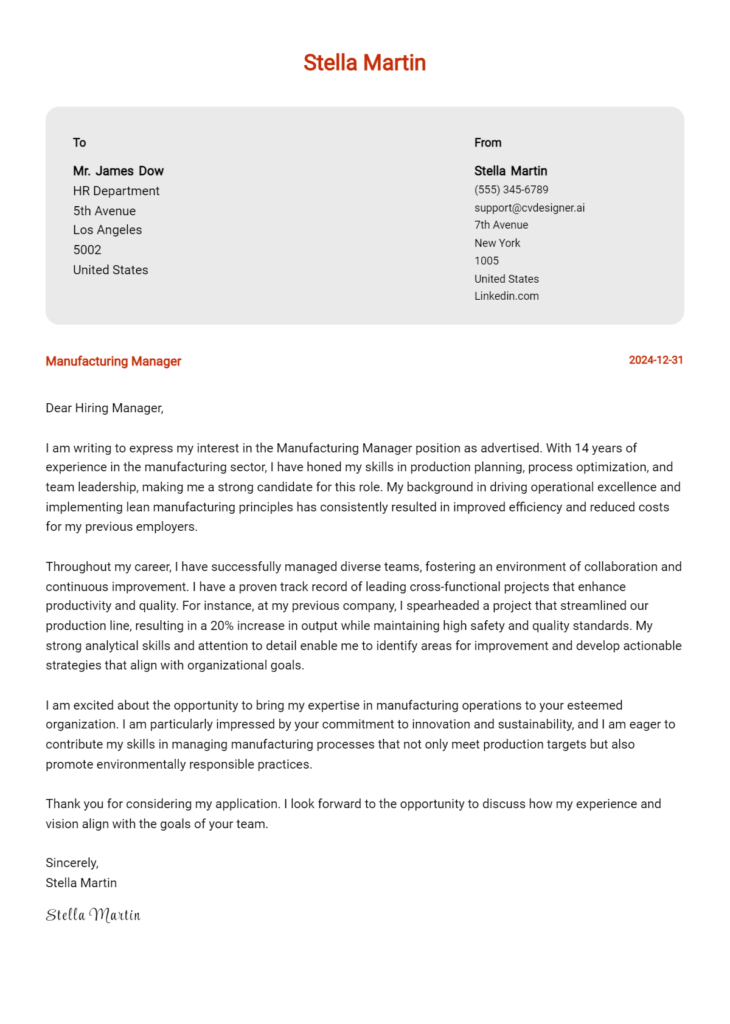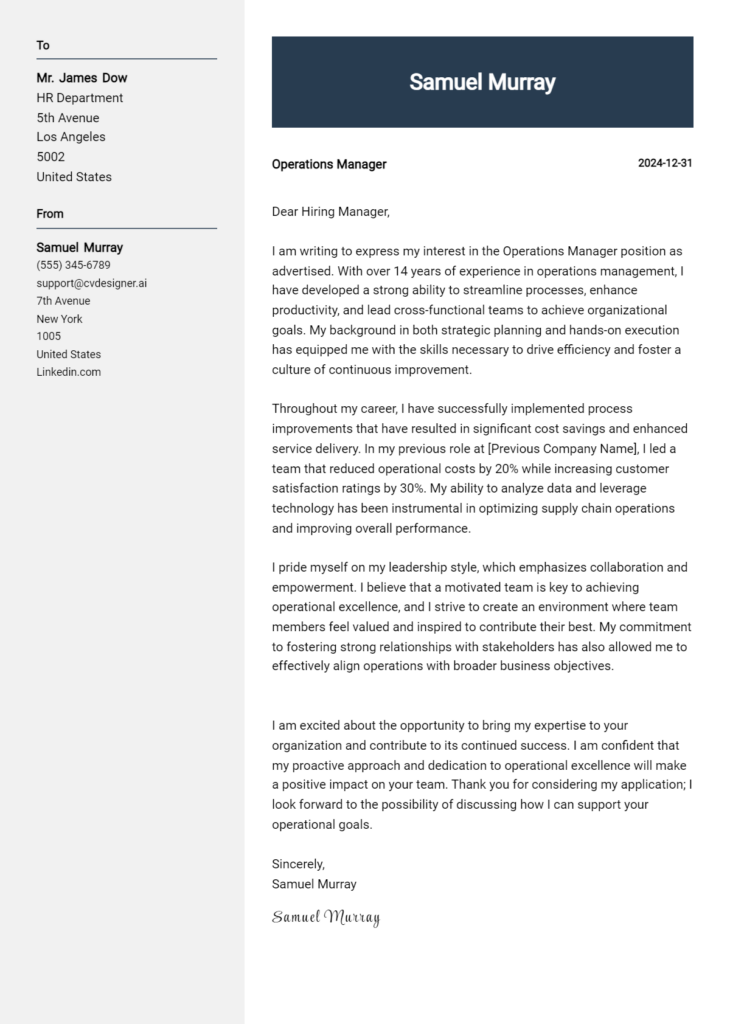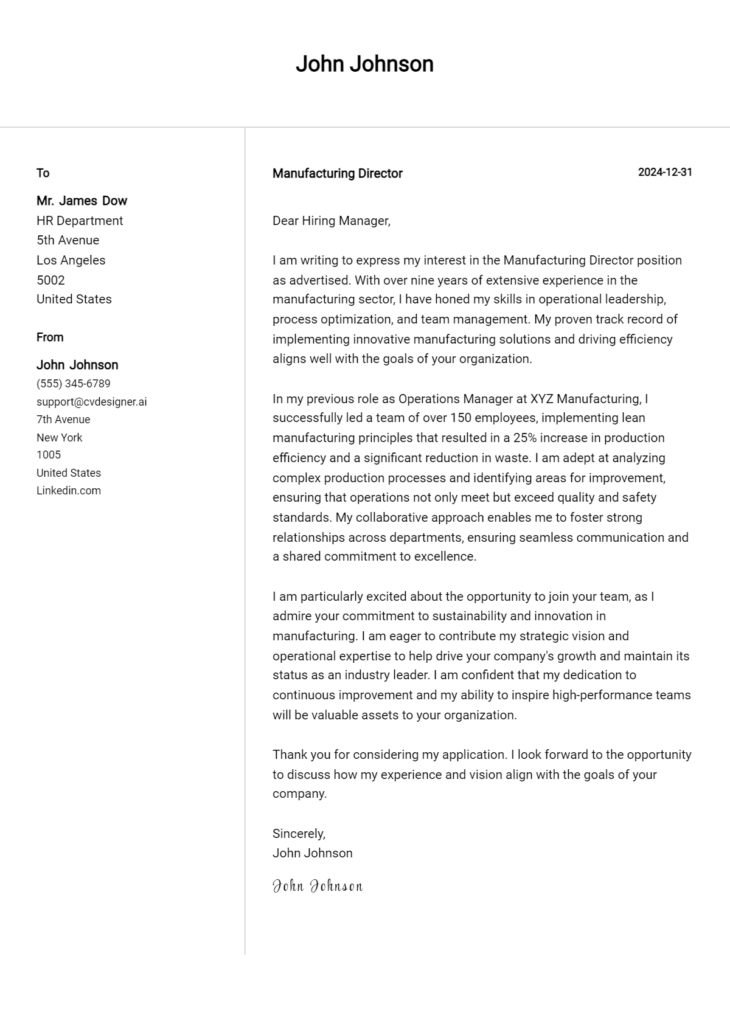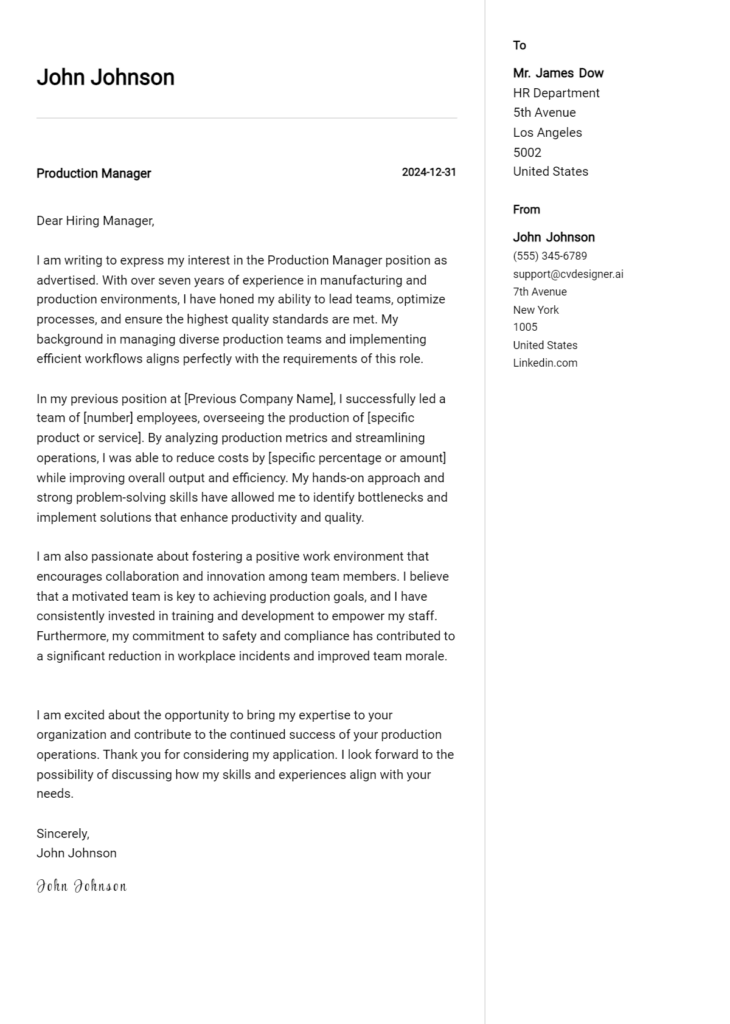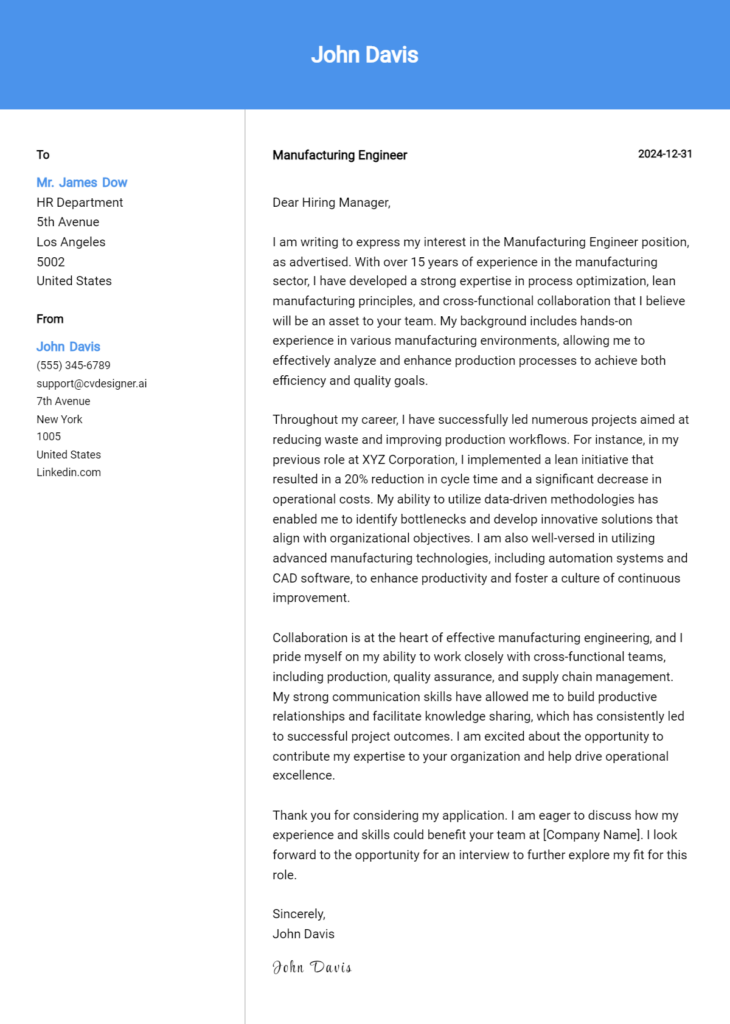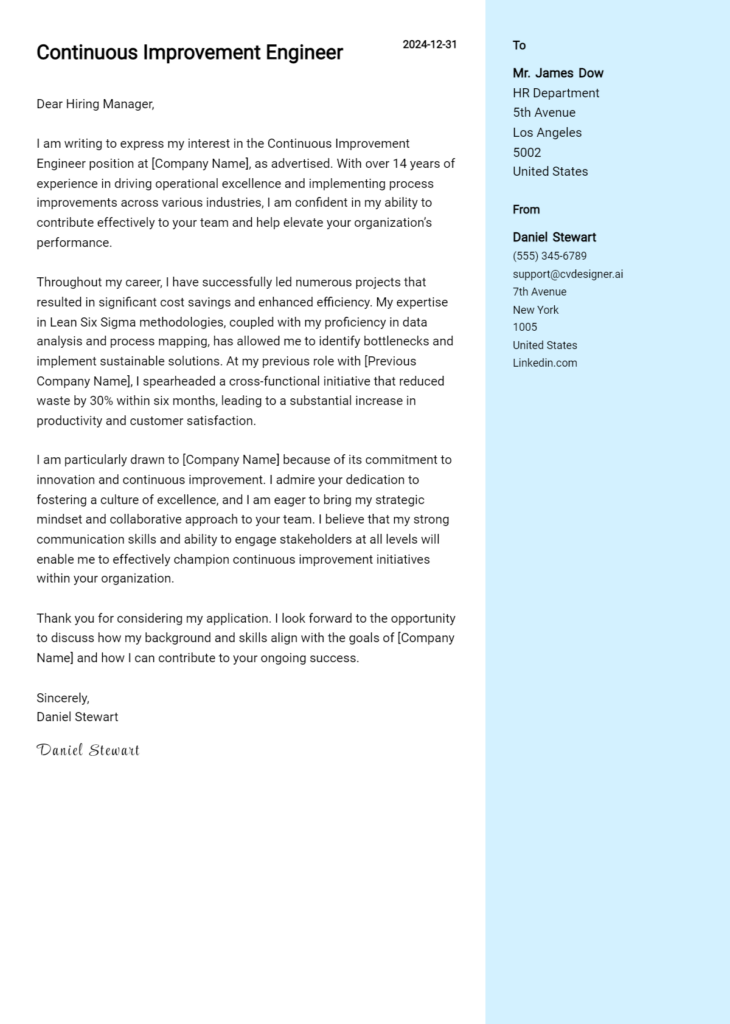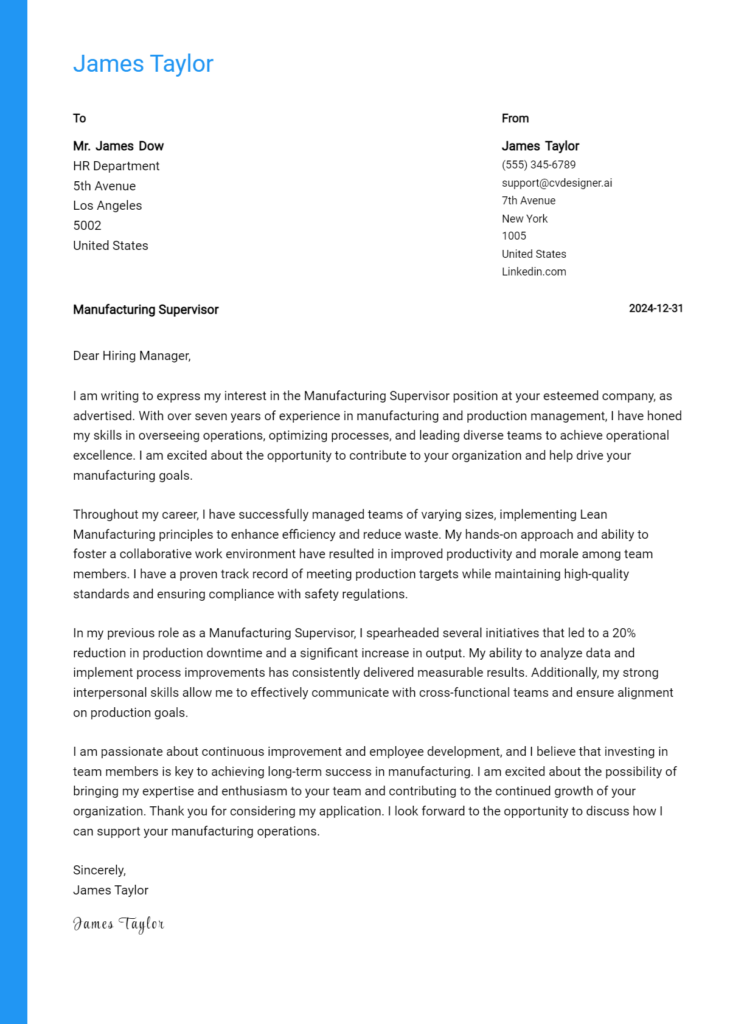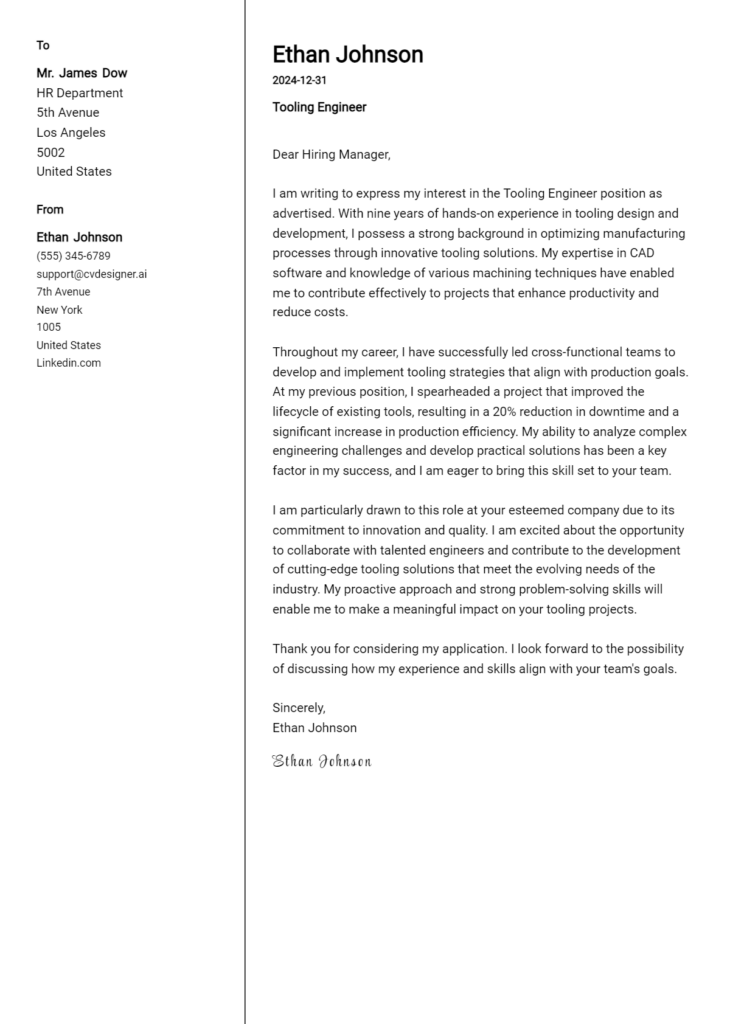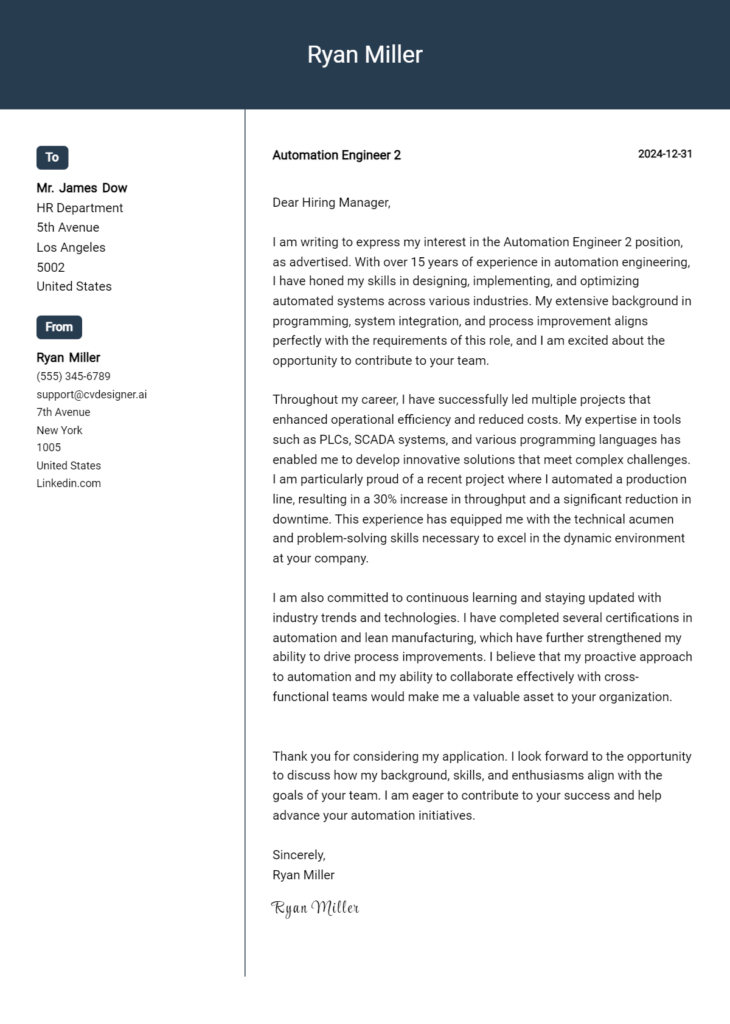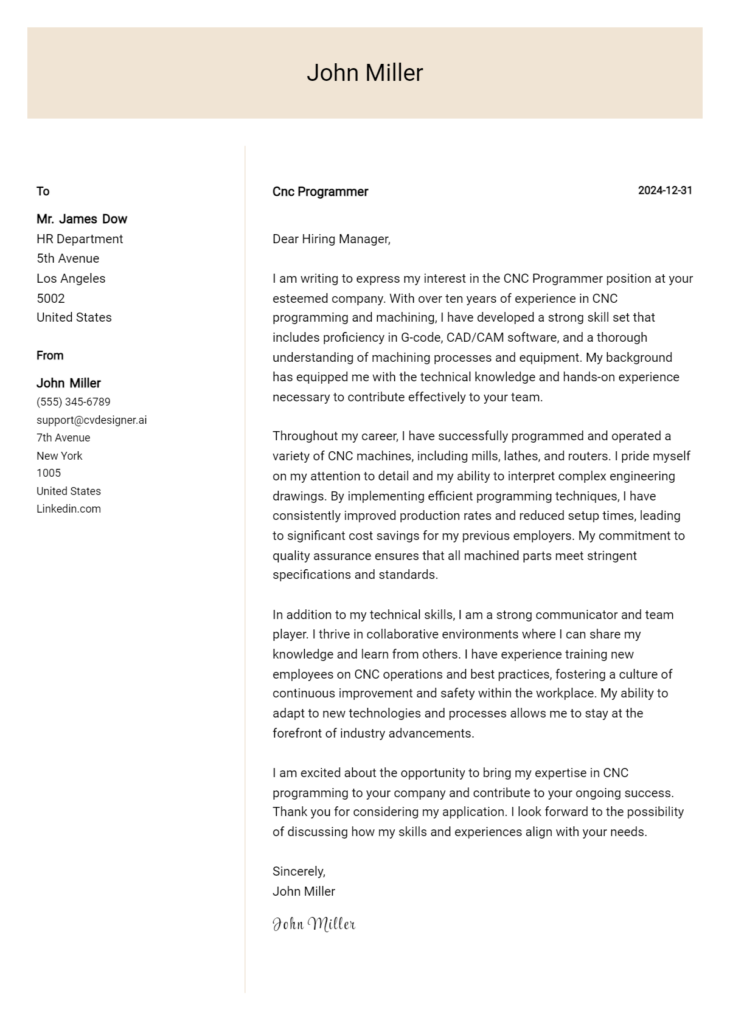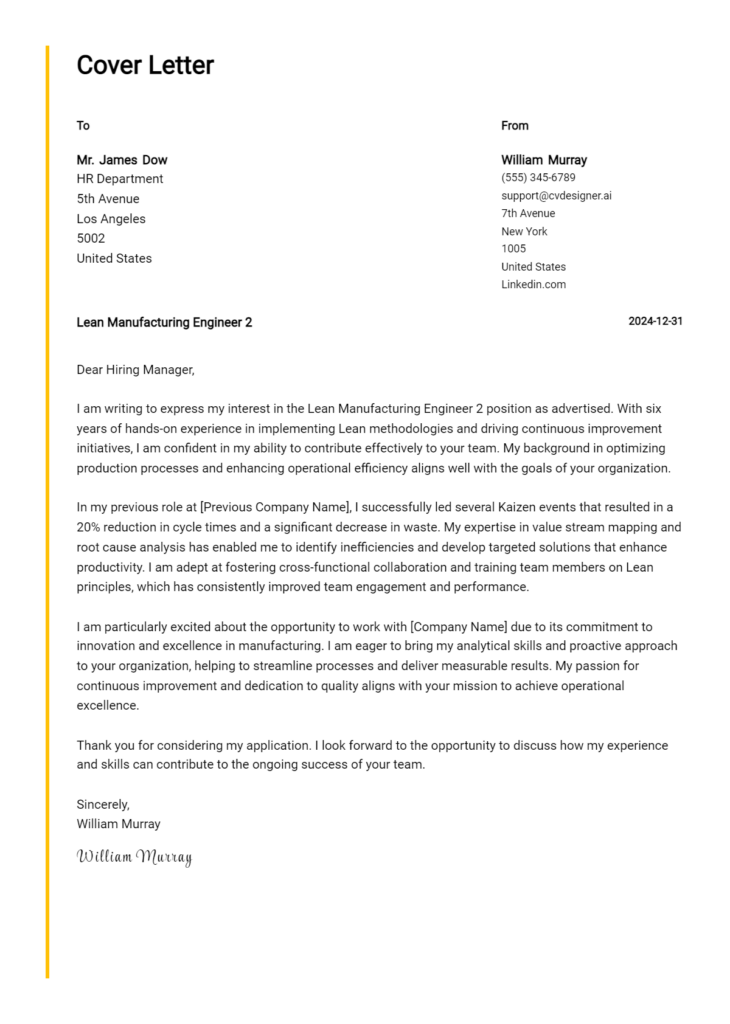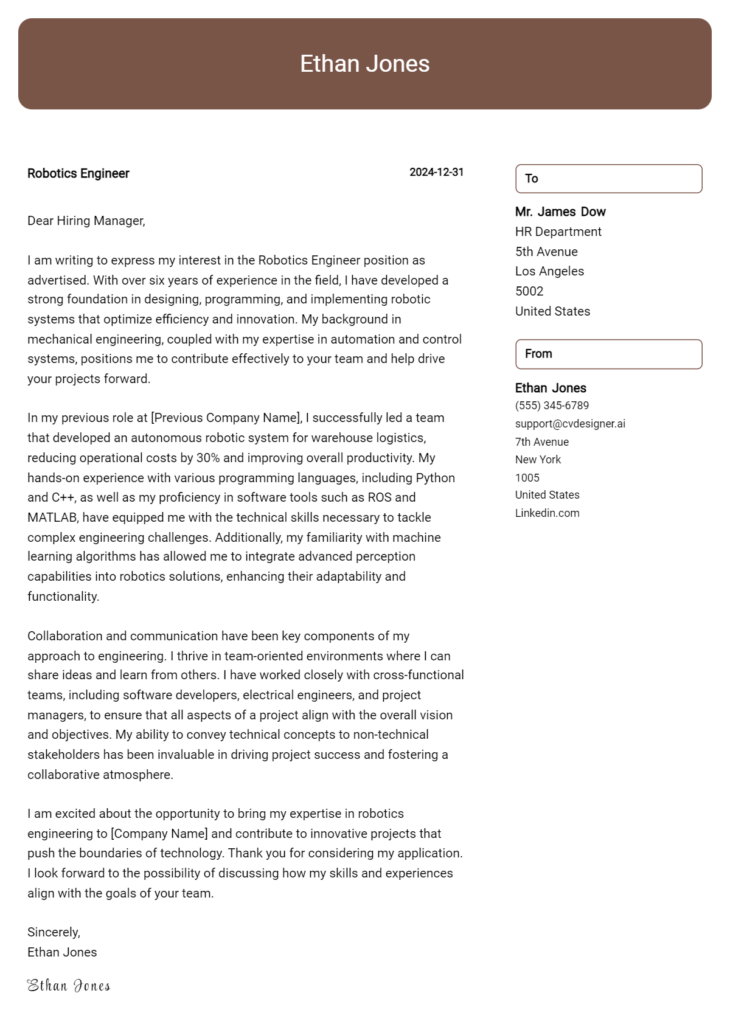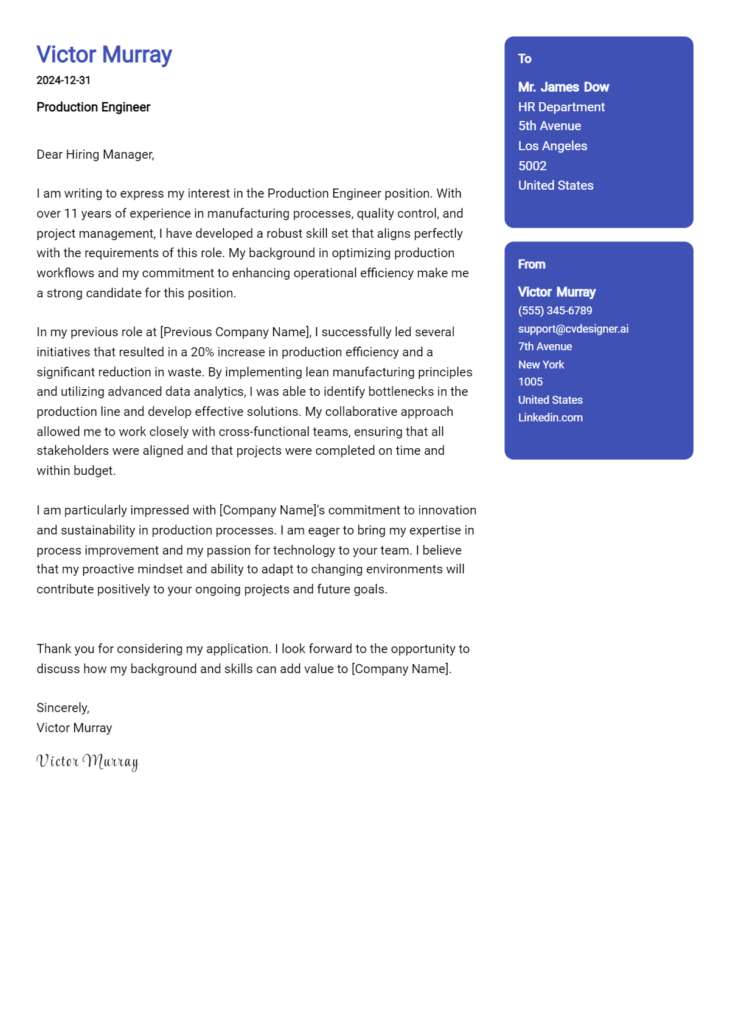Industrial Engineer Cover Letter Examples
Explore additional Industrial Engineer cover letter samples and guides and see what works for your level of experience or role.
How to Format an Industrial Engineer Cover Letter?
Crafting a well-structured cover letter is essential for industrial engineers, as it serves as your first opportunity to present your skills and expertise to potential employers. The way you format your cover letter not only highlights your technical capabilities but also demonstrates your problem-solving skills and attention to detail—key attributes in the field of industrial engineering. A clear and organized cover letter will draw the hiring manager’s attention and set a professional tone, allowing you to effectively communicate your qualifications.
In this guide, we will outline the necessary components of a professional cover letter, including:
- Cover Letter Header
- Cover Letter Greeting
- Cover Letter Introduction
- Cover Letter Body
- Cover Letter Closing
Each section plays a crucial role in showcasing your qualifications and professionalism. Let’s explore how to structure each part to ensure your industrial engineer cover letter stands out.
Importance of the Cover Letter Header for an Industrial Engineer
The cover letter header is a crucial component of any professional application, especially for an Industrial Engineer. It serves as the first impression to potential employers and sets the tone for your correspondence. A well-structured header not only provides essential contact information but also reflects clarity and professionalism. It should include your name, address, phone number, email, the date, and the recipient's details (name, title, company name, and address). Proper formatting and attention to detail in this section can distinguish you from other candidates and convey your organizational skills, which are vital in the field of industrial engineering.
Strong Example
John Doe 123 Engineering Lane Cityville, ST 12345 (123) 456-7890 johndoe@email.com October 5, 2023 Jane Smith Hiring Manager Tech Innovations Inc. 456 Technology Drive Cityville, ST 12345
Weak Example
johndoe@email.com 10/5/23 jane s tech innovations
The Importance of a Cover Letter Greeting for an Industrial Engineer
The greeting of your cover letter is more than just a salutation; it sets the tone for the entire letter and reflects your professionalism and attention to detail. A well-crafted greeting demonstrates your respect for the recipient and your genuine interest in the position. By addressing the hiring manager directly, you create a personal connection that can make your application stand out. Avoiding generic greetings, such as "To whom it may concern," is crucial, as it can come off as impersonal and uninspired. Instead, take the time to research the recipient's name and title when possible, which shows initiative and a commitment to your application.
Here are examples of strong and weak greetings for an Industrial Engineer cover letter:
Strong Greeting Example
Dear Mr. Smith,
Weak Greeting Example
To whom it may concern,
Importance of a Well-Crafted Cover Letter Introduction for an Industrial Engineer
A well-crafted cover letter introduction is crucial for any Industrial Engineer looking to make a strong impression on potential employers. This opening paragraph serves as the first point of contact with the hiring manager, making it essential to capture their attention immediately. An effective introduction should not only express the candidate's enthusiasm for the role but also highlight key skills or achievements that align with the job requirements. A compelling introduction can set the tone for the entire letter, showcasing the candidate's qualifications and making a memorable first impression.
Strong Example
Dear [Hiring Manager's Name], As an accomplished Industrial Engineer with over five years of experience in streamlining production processes and reducing operational costs, I am excited to apply for the Industrial Engineer position at [Company Name]. My proven track record in implementing Lean Six Sigma methodologies has not only improved efficiency by 30% in my current role but has also fostered a culture of continuous improvement within my team. I am eager to bring my expertise in process optimization and project management to your innovative team at [Company Name].
Weak Example
To Whom It May Concern, I am writing to apply for the Industrial Engineer job. I have some experience in the field, but I’m not sure if it’s relevant. I think my skills might be useful for your company. I hope to hear back from you soon.
Purpose of the Cover Letter Body for an Industrial Engineer
The body of a cover letter for an Industrial Engineer serves as a critical platform for candidates to articulate their professional competencies, relevant experiences, and the unique value they can bring to the organization. This section should effectively highlight specific projects, accomplishments, and skills that align with the job description, demonstrating how the candidate's background makes them an ideal fit for the role. By illustrating their problem-solving abilities and successful implementation of engineering principles in real-world scenarios, the candidate can distinguish themselves from others.
Strong Example
In my previous role at XYZ Manufacturing, I led a project to redesign the assembly line process which resulted in a 20% increase in efficiency and a 15% reduction in waste. By implementing lean manufacturing principles and conducting time-motion studies, I identified bottlenecks that were hindering production flow. My efforts not only improved operational efficiency but also saved the company approximately $250,000 annually. I am excited about the opportunity to bring my experience in process optimization and quality control to ABC Industries, where I aim to contribute to innovative solutions that drive productivity and sustainability.
Weak Example
I have worked in various engineering roles and have some experience with projects. I think I would be a good fit for your company because I know a lot about engineering. I hope to help with your production processes. I have done some things that might improve efficiency.
Importance of Cover Letter Closing for an Industrial Engineer
The closing paragraph of a cover letter is a critical component that reinforces the candidate's qualifications, expresses enthusiasm for the role, and prompts the employer to take the next steps, such as reviewing the resume or scheduling an interview. A strong closing not only summarizes key points but also leaves a lasting impression that can set the candidate apart from others. Conversely, a weak closing can diminish the impact of the entire letter, failing to convey eagerness or professionalism.
Strong Example
Thank you for considering my application for the Industrial Engineer position. With my extensive background in process optimization and commitment to efficiency, I am excited about the opportunity to contribute to your team. I am eager to discuss how my skills can benefit your organization and would appreciate the chance to further explore this role in an interview. Please find my resume attached for your review. I look forward to your response.
Weak Example
I hope you look at my resume. I think I would be okay for the Industrial Engineer job. Let me know if you want to talk.
These tips will assist candidates in crafting an effective cover letter tailored for the role of an Industrial Engineer. A well-written cover letter is crucial as it provides an opportunity to showcase not only technical skills and problem-solving abilities but also familiarity with the Software Development Life Cycle (SDLC), teamwork capabilities, and a passion for continuous learning. By emphasizing these attributes, you can make a strong case for your candidacy and stand out in a competitive job market.
Tips for Writing a Cover Letter for Industrial Engineer
Highlight Your Technical Skills
Clearly outline your technical expertise relevant to industrial engineering. Mention specific software tools (like AutoCAD, MATLAB, or Six Sigma) and methodologies you are proficient in. This will demonstrate your readiness to tackle the technical challenges of the role. Use examples from past projects to illustrate how you've applied these skills effectively.Demonstrate Problem-Solving Abilities
Industrial engineers are often tasked with optimizing processes and solving complex problems. Share a specific instance where you identified a problem, analyzed data, and implemented a successful solution. This not only showcases your analytical skills but also your ability to drive improvements in efficiency and productivity.Show Knowledge of the Software Development Life Cycle (SDLC)
If your role involves working with software systems, it's essential to convey your understanding of SDLC. Discuss any experiences where you participated in project phases, from requirements gathering to testing and deployment. This shows potential employers that you can collaborate effectively with IT teams and understand the technical aspects of the projects you'll be involved in.Emphasize Teamwork and Collaboration
Industrial engineering often requires collaboration across various departments. Highlight your experience working in teams and your ability to communicate effectively with diverse groups. Discuss a project where teamwork led to a successful outcome, illustrating your interpersonal skills and how they contribute to a positive work environment.Express a Passion for Continuous Learning
The field of industrial engineering is always evolving, making it essential for professionals to stay updated. Mention any recent certifications, courses, or workshops you have attended. Your commitment to continuous learning will signal to employers that you are proactive in enhancing your skills and adapting to new challenges.
For additional resources, consider exploring our cover letter templates or utilize our cover letter builder to create a polished and professional cover letter that aligns with these tips.
Common Mistakes to Avoid in an Industrial Engineer Cover Letter
Crafting a compelling cover letter is essential for making a strong impression on potential employers in the field of industrial engineering. Avoiding common mistakes can significantly enhance your chances of landing an interview. Here are some pitfalls to steer clear of:
Generic Content: Tailoring your cover letter to the specific job and company is crucial. A generic letter may suggest a lack of interest. Always personalize your content to reflect the job description and company culture.
Spelling and Grammar Errors: Typos and grammatical mistakes can undermine your professionalism. Always proofread your letter or use tools to check for errors before submission.
Overly Lengthy Letters: Keep your cover letter concise and focused. Aim for a length of one page and ensure every sentence adds value to your application.
Neglecting to Highlight Relevant Skills: Industrial engineering requires specific skills. Ensure you showcase relevant technical abilities and experiences that align with the job requirements.
Using Passive Language: Active language creates a stronger impact. Use assertive phrases that demonstrate your achievements and contributions in previous roles.
Failing to Include a Call to Action: Conclude your letter with a proactive statement, such as expressing your desire for an interview or a follow-up discussion. This shows your enthusiasm for the position.
Ignoring Formatting Guidelines: Proper formatting is essential for readability and professionalism. Follow a clean structure, and consider reviewing cover letter format guidelines for best practices.
By steering clear of these common mistakes, you can develop a more effective cover letter that enhances your chances of securing an interview. For more inspiration, check out cover letter examples tailored for industrial engineering roles.
Cover Letter FAQs for Industrial Engineer
What should I include in my cover letter as an Industrial Engineer?
In your cover letter, start with a strong introduction highlighting your interest in the position and the company. Clearly state your qualifications, including your educational background in industrial engineering, relevant certifications, and any specialized skills, such as experience with Six Sigma or Lean manufacturing. Showcase specific projects or achievements that demonstrate your problem-solving abilities and efficiency improvements. Additionally, explain how your skills align with the company's goals and needs. Finally, express your enthusiasm for the role and invite the employer to contact you for further discussion.
How can I tailor my cover letter to a specific job?
To tailor your cover letter, thoroughly read the job description and identify key skills and experiences the employer is seeking. Use specific language from the job posting and mirror the terminology they use when discussing your qualifications. Highlight any relevant projects or experiences that relate directly to the responsibilities listed in the job description. If the company focuses on sustainability, for instance, include any relevant work you’ve done in that area. Personalize your cover letter by mentioning the company's projects or values that resonate with you, demonstrating your genuine interest in the organization.
How long should my cover letter be?
A cover letter for an Industrial Engineer position should ideally be one page long, consisting of three to four paragraphs. Aim for approximately 250 to 400 words. This length allows you to convey your qualifications and enthusiasm without overwhelming the reader. Be concise and focus on the most relevant experiences that showcase your skills and achievements. Use clear and professional language, and avoid unnecessary jargon. Remember, the goal is to make a strong impression quickly, so stick to the essentials while maintaining a professional tone.
Should I mention salary expectations in my cover letter?
Generally, it is not advisable to mention salary expectations in your cover letter unless the employer explicitly requests this information. Your cover letter should primarily focus on your qualifications, skills, and enthusiasm for the role. If the job application requires a salary range, consider including it in a separate section or during the interview process. By keeping the focus on your abilities and how you can contribute to the company, you create a stronger impact and demonstrate your professionalism, leaving salary discussions for a more appropriate time.
Build your Cover Letter in minutes
Use an AI-powered cover letter builder and have your letter done in 5 minutes. Just select your template and our software will guide you through the process.

